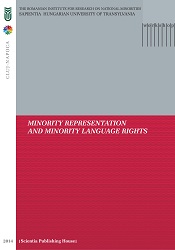The (Trans)Formation of Minority Politics in Serbia and the Installation of Personal Autonomy (National Councils)
The (Trans)Formation of Minority Politics in Serbia and the Installation of Personal Autonomy (National Councils)
Author(s): Csaba Máté Sarnyai, Tibor Pap
Subject(s): Politics / Political Sciences
Published by: Scientia Kiadó
Summary/Abstract: The main aim of the lecture is to present the main and definitive turning points in the formation of Serbian minority institution systems, a process that has been ongoing in the last decade since the belated change of system in 2000, along with the consolidation of a democratic political establishment. We aim to highlight how majority–minority relations have been affected (1) by the fact that the political arena now includes personally principled spaces of action and (2) by the diversification of the policy methods through some innovative minority political tools. In the first section, the process is examined with regard to both the 2008 and 2012 (provincial and national) elections and the 2009 and 2012 presidential elections. We also discuss those background motives (of both the Serbian national political efforts and political self-representation of Serbian minorities) that influenced the minority-related dimensions of the aforementioned elections. The second part summarizes the political context of the first two elections of the national councils (NTs), including the formation of the act on national councils. The criticism on the NT act and its politico-theoretical aspects are highlighted subjects to discuss, as well as the so-called expert vs. politician issue and the matter of the electoral register. The third part focuses on the anomalies both in the vertical structure of politics/administration and in the competences (decision-making rights) of personally principled autonomies. Some so far detectable tensions and certain impending, potentially critical issues of these anomalies are analysed as well. The fourth section presents challenges in the multi-agent political space of minority institution system. It also discusses the controversies of the majority principle within minority decision-making. Minority self-governance and the (lacking) regional autonomy in Serbia would depend on/support each other. The final section addresses the issue of ‘bottom-up’ organized institutions and their role both in the democratization of society and the stabilization of the West Balkan region. The particular example for the above practical, socio- and politico-theoretical considerations in the field of minority representation and minority policy is the institutional system of national councils in Serbia, but the arising questions are quite relevant from national and European perspective as well.
Book: MINORITY REPRESENTATION AND MINORITY LANGUAGE RIGHTS
- Page Range: 263-276
- Page Count: 14
- Publication Year: 2014
- Language: English
- Content File-PDF

